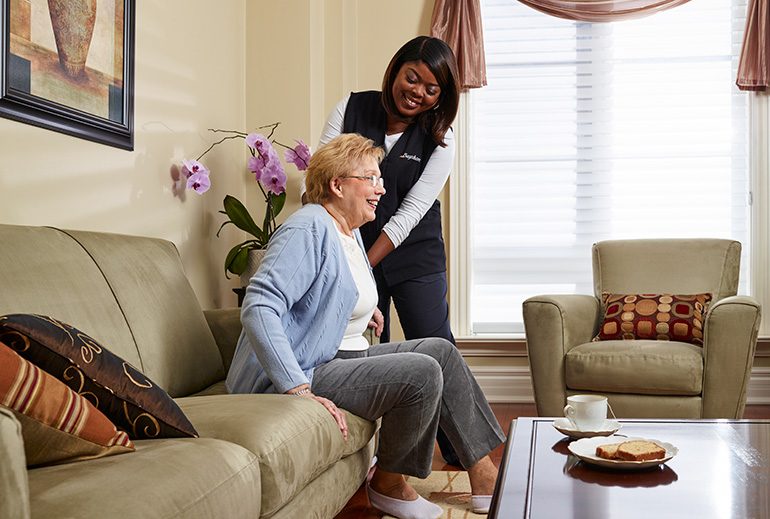How to Introduce a Caregiver

Families hire paid caregivers for their elderly loved ones for different reasons. Family caregivers need help to complete the many required tasks, or they need a break from the physical and emotional demands of caregiving. Family members may live too far away to provide support regularly. Often, a senior’s needs are too many or too complex for families to handle on their own.
Professional caregivers lighten the load on stressed-out, worn-out families, including adult children juggling senior care with careers and their own households. Caregivers provide a wide range of services, including personal care (assistance with eating, grooming, bathing, dressing, toileting), health care (medication reminders, escorts to appointments) and housekeeping (help with laundry, cleaning, cooking, grocery shopping). They engage seniors in activities, take them on outings and provide companionship. Often, support from paid caregivers is the reason why seniors can continue to live at home rather than move to a long-term-care facility or retirement residence.
Seniors sometimes resist the idea of paid help. Your loved one might not agree that they need support, or they don’t want a “stranger” in their home. No doubt, hiring a caregiver is a major change. It will take time for everyone – including you – to adjust. Here are some tips to improve the chances of success:
1. Introduce the idea of caregiving.
You can talk to your loved one about caregiving even before he or she needs it. If you anticipate denial or resistance, suggest hiring a “housekeeper.” Seniors often find this easier to accept. If your loved one won’t discuss the subject, bring it up another time.
If your loved one already needs caregiving, try broaching the subject in different ways. Say that hiring someone helps you by reducing physical tasks or calming your worries. Explain that home care helps your loved one continue to live independently. Ask your loved one’s doctor to support the idea. Propose that a caregiver visit on a trial basis. Once your loved one sees the benefits, they may warm up to the idea and even request additional services.
2. Find a qualified caregiver.
You can find, interview and supervise caregivers yourself or work with a home care agency. Families often prefer agencies for the reassurance that caregivers have been screened, they have the necessary skills and they’re eligible to work in Canada. Agencies also manage scheduling, payments, hiring and firing, and mediation of disagreements.
A reputable home-care agency will send a staff member to your loved one’s home to conduct an assessment and create a care plan, with your help. This helps the agency understand the types of support needed, as well as your loved one’s lifestyle, personality and preferences. Agencies use this information to find a compatible caregiver – perhaps even someone with a similar cultural background, common language or shared interests.
Whether you hire privately or through an agency, involve your loved one in choosing the caregiver and planning the “job description,” to help them feel more in control.
3. Take things slowly.
Once you’ve chosen a caregiver, start slowly and set a positive tone from the first visit. Start with a couple of visits a week, a few hours at a time. Try to be present or ask another relative, to help your loved one feel comfortable.
Use these early visits to show the caregiver how you usually do things, to help ensure a smooth transition. A skilled caregiver will also try to create a connection with your loved one through conversation, common interests and activities.
4. Stay involved and in touch.
Good communication will help ensure a successful working relationship with caregivers. Talk to your loved one frequently to see how he or she is adjusting. Have regular discussions with the caregiver as well. This will help the caregiver do a great job, resolve any misunderstandings or problems, and allow you to monitor your loved one’s needs as they change.
It may take a few weeks to determine if a caregiver’s skills and personality are a good fit. If you don’t think it’s working out, discuss your concerns with the agency. Finding compatible people could take a while – try to be patient. Over time, with the right caregiver or team of caregivers, your loved one may start looking forward to their visits!
At Bayshore HealthCare, we match caregivers to our clients’ unique needs. Our services are very flexible – use just the services your family needs, with no long-term contracts. To learn more about our services, call 1-877-289-3997 or visit our home care page.
